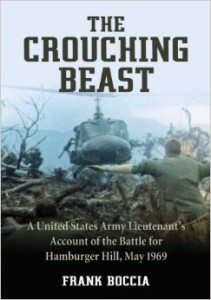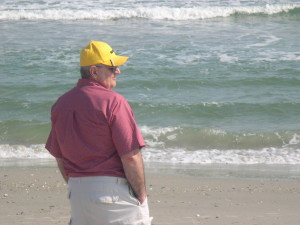Editorial note: the content below is unedited. Only format changes have been made to the content to improve readability. This post does not necessarily reflect my own personal views, but those of the credited author.
Normally I write everything posted here, but on rare occasions, I’ve seen fit to make an exception and publish the (properly credited) work of another writer.
This happens to be one of those rare occasions…a very pleasant surprise, written and submitted for your consideration by a friend.
My friend (and fellow author) Frank Boccia is a very interesting man.
His book http://thevintry.com.au/wp-json/wp/v2/product/481 The Crouching Beast was firsthand account of the Battle in the AShau Valley for Dong Ap Bia — more popularly known as “Hamburger Hill”. Frank’s work received rave reviews from the most important critics one can possibly encounter — people who “have been there” and lived through the experience the writer has attempted to describe.
His critics unanimously agreed — Frank is a great writer with the uncanny ability of being able to put the reader in his shoes. And now without further ado, these are Frank’s thoughts on rationalism.
I am a rationalist.
I was born that way; it’s the way my brain is wired. Being a rationalist does not imply that one necessarily has one belief system rather than another. It is simply how we see and evaluate the world. We see cause and effect, in linear paths.
But that is all: My father was a thorough rationalist; a man whose occupation involved the formulation of the theories of statistical economics. He was also a devout Roman Catholic to the end of his life.
Many atheists, on the other hand, are anything but rational in their arguments, which often are emotive and diffuse. Nor does being a rationalist mean that we are always rational in our actions. The human psyche is not that simple.
I mention all this to lay the background for what has occurred over the past year or so of my life. Whatever religious faith I had died quickly in the irrationality of war: Some died, some lived, and a rational brain had no choice but to see in that the work of random chance.
The explanation given by some, that God had “a plan” for them, filled me with disgust and scorn. It struck me as the worst of egocentric self-congratulation: “God spared me because He has a plan for me. He doesn’t give a rat’s ass about the ones who died.”
What I saw was that some who died were among the best of men, while some who lived were among the worst. Where is the justice in that? Where is there a rational explanation?
So I lived my life, seeking, as ever, cause and effect, factual data over speculation, concrete evidence over wishful thinking. I retained enough of my boyhood schooling to acknowledge the rational structure, built over the centuries by brilliant men, of the church I was raised in, but that’s what it was: A structure, and empty of any real meaning.
So I might have ended my days. Then came a crushing blow: I was diagnosed with a crippling, deadly disease, with no known cure. Life changed: From climbing mountains to laboring to climb steps. From easily lifting one hundred pound cases to barely hoisting fifteen pound boxes. The diagnosis was quick and to the point: I had perhaps three years to live, and they would be a miserable three years.
I accepted this with no particular regret, and certainly not denial. Did I not already know, from my experiences in combat, that life was a crapshoot? That we lived or died by chance, and by chance alone? Then why get upset over this? In the infamous phrase of the new millennium: It is what it is.
author Frank Boccia
I was content to live out the rest of my life with as much dignity as I could, and accept the hardships that came with the disease. And they were many: Surgery after surgery.
Three code blues in a hospital, during one of which I almost died. Uncontrolled internal bleeding. Lung cavities filled with fluid, making breathing difficult. Pain was a daily companion. I was alone, and dying, but this was, after all, what the dice had ordained.
Then, a year ago, quite by chance, I began corresponding with a relative, one whom I had known, of course, but had had no particular contact with. Acquaintance became friendship; friendship became intimacy, not of the body –impossible in any case, but also because we were separated by thousands of miles– but of the spirit, the heart and the mind.
I was ever the rationalist; she the spiritualist, but we shared so many things, and chief among them the beauty and wonder of the world we live in. Gradually, I became aware that for her, all this beauty, all the affection and even love that had burgeoned between us, was a part of her faith. She neither lectured nor questioned; she simply lived as she believed her faith required her to.
She began to pray for me, for my health and for my soul. I accepted this with grace, but the rationalist in me shrugged. My fate was sealed, by the words of the experts. No one survived this disease. And my soul was as dead as my body soon would be. But I thanked her for her love and caring.
I was alone, and lonely. Oh, my writing kept me busy, but I was still alone. It is one thing to be lonely. It is quite another to be lonely with the knowledge that one will never be anything else in his life. This too had to be accepted. It is what it is. For all the affection and love that our correspondence brought, my life was one of isolation.
The image of Frank he wanted the reader to see
And then something extraordinary happened. I met someone, someone who was not daunted by my disease, my crippled body, my severe limitations. She too was alone, and hungered for the same things I did: A smile, a touch of the hand, the feel of a warm human presence.
I had not dared think this was possible. When I told my cousin about this, she was elated, but also said, almost complacently, that this was what she had been praying for, throughout the year.
Of course, this had no bearing on what had happened. It was, as everything else in my life had been, chance.
Chance. The god of my life.
But back to this year. I had companionship, and a dear friend. I had purpose. And then, during a routine visit to the clinic for my weekly chemo treatments, came the electrifying news: No more treatments. My numbers were stable, and the oncologist decided there was no further need for chemo.
The disease was in remission –and that had never happened before. Never. No one lived past three or four years with this disease. I had lasted seven years, and now could face the future with hope. The damage was irreversible, and considerable, but it would not get worse.
Both of the women in by life were ecstatic, and both told me of the countless prayers they had offered over the months. Both firmly believed that this unprecedented recovery was due to those prayers, and the love behind them.
I am a rationalist.
I began to look at my past, and this time with an unfettered mind. I went back to the war, and the countless times I should have died. I won’t list them here; but they are many, and in some cases inexplicable, such as the time when I and four others were surrounded by a vastly superior force.
I looked at my life since. Many bad things had happened, but none of them had been truly life-destroying blows. I had survived. And now, the past year… chance had led me to my cherished cousin –a routine e-mail. Chance had brought to me a wonderful, loving woman who will share the rest of our lives with me.
Chance had decreed that I would not die in a hospital bed, or of a failed heart, or of the many times when the medical professionals had shaken their collective heads and written me off. Chance had made me the only known survivor of this deadly disease… chance.
But rational people must look at the evidence. I know about probabilities. I invented and perfected a sophisticated game that was based entirely on probability. I can calculate odds. That is why I never play the lotto. That is why I never draw to an inside straight. That is why… I could no longer believe in chance. The odds were too great, too improbable.
The other reality that begged for my attention and evaluation was the fact that both the women I love so deeply are women of faith. They believe in a God who can and does respond to prayer. They believe in the spirituality I had rejected so many years ago. So had my father, probably the best man I have ever encountered, and certainly one of the most intelligent. Another close friend, a third woman, whose life has been intertwined with mine for so many years, is also a woman of faith and belief.
The rational mind does not inexorably gravitate to a belief system. I once saw a debate (and it is flattery to call it such) among Madeleine Murray O’Hare, a fundamentalist preacher, and an agnostic. The two irrational people were the preacher and the atheist. They simply proclaimed, and sat back, satisfied. The agnostic was probing, asking and answering difficult questions.
In the end, the atheist and the fundamentalist had the same closed mind, the same self-righteous contempt for anyone else’s views, and the same unreasoning certainty. The only difference was that the preacher was by far the politer of the two.
So my rationality has led me to at least question my rejection of the spiritual. No, I do not and never will believe in ghosts or crop circles or anything like that. I can’t cease being rational. But I must admit what the evidence presents: Life cannot be pure chance.
When one person decrees that the complexity of life on earth began as a fortuitous combination of chemicals, and another says that in fact it began as a deliberate and rational design, the rationalist must judge between the two without considering either the source nor the linguistic labels usually associated with the two. The first statement is almost always phrased something like this: “The rational explanation for the origin of life is the spontaneous creation of self-propagating cells…” while the second is almost always stated “Religious dogma, or Creationism posits the creation of the universe by a Supernatural Being…”
Neither statement is factual. Both are opinion: That is, in one the speaker assumes the quality of rational thought by simply stating it. One might as well assume that one’s height is 6’6″ by asserting it is so. In the second, that same speaker, again through assertion, attributes irrationality to the statement.
But a truly rational mind doesn’t do that. We must look at the evidence. Which is the more unlikely: That life began as an entirely (and to date not reproduced in nature) accidental combination of specific chemicals, or that some degree of rational thought on the part of a being whom we refer to as the Creator resulted in its present complexity?
This last is not my argument: It was stated, and much more clearly, by C S Lewis, and a more rational man never existed. Those who know him only for his childish Narnia series and have never read his serious novels and his essays and other analytical works would have no idea of his brilliance. I must agree with Lewis. I must see what has happened in my life, and what is the world is, and reject the notion that all this is governed by the laws of probability, as my game was.
Such a conclusion is too irrational.




Speak Your Mind